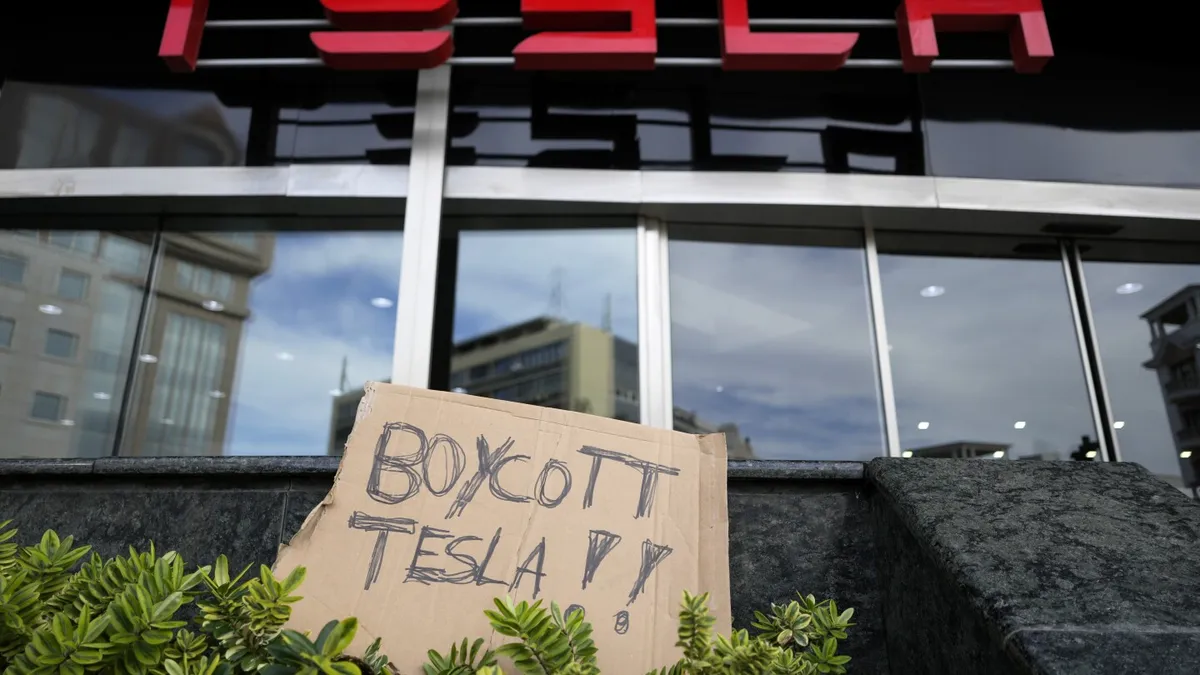
In what is being described as one of the worst single-day sell-offs in Tesla history, President Donald Trump has publicly expressed his support for his advisor and billionaire entrepreneur, Elon Musk. Trump announced his intention to purchase a Tesla vehicle on Tuesday, amidst a backdrop of significant turmoil for the electric vehicle manufacturer. Tesla's stock has experienced a staggering decline of 45% in 2025, primarily due to intensified competition from rival electric vehicles, particularly from China.
On Monday, Tesla shares plummeted more than 15% to $222.15, marking the lowest price since late October. This sharp decline reflects growing pessimism among investors as global sales continue to dwindle. In a recent post on his Truth Social platform, Trump praised Musk for "putting it on the line" to aid the nation, while alleging that "Radical Left Lunatics" were engaging in a collusive boycott against Tesla, which he referred to as one of the world’s great automakers and Musk’s "baby." Following Trump’s endorsement, Tesla’s stock saw a slight recovery, climbing over 3% before the market opened on Tuesday.
Numerous analysts within the auto industry have linked Tesla’s recent stock slump and declining auto sales to Musk's political affiliations, particularly his support for Trump and other right-wing figures globally. This political climate has led to protests outside Tesla showrooms in the U.S., where vehicles have been vandalized. To avoid backlash, some Tesla owners have resorted to displaying bumper stickers with messages like, “I bought it before Elon went nuts.”
Furthermore, federal prosecutors have charged an individual in connection with a series of vandalism incidents at a Colorado Tesla dealership, which included attacks involving Molotov cocktails and graffiti labeling Tesla vehicles as "Nazi cars."
Musk has made substantial financial contributions to Trump’s campaign, investing $270 million as the 2024 election approaches. His public support for Trump has seen him appear on stage with the former president, celebrating Trump’s victory over Democratic candidate Kamala Harris. Despite a high point where Tesla stock soared to $479 per share by mid-December, the company has since lost nearly half of its value.
Additionally, Musk has been associated with the Trump administration's controversial efforts to cut government spending, notably through the Department of Government Efficiency (DOGE), which has promised massive layoffs of federal workers. Analysts suggest that Musk's shift toward right-wing politics is alienating potential Tesla buyers, who are generally regarded as affluent and progressive consumers.
Tesla is facing a dramatic downturn in sales, particularly in California, its largest U.S. market. The company reported its first annual global sales decline last year, with January seeing a staggering 45% drop in sales in Europe, according to the research firm Jato Dynamics, despite an overall rise in electric vehicle sales in the region. The sales figures were especially concerning in Germany and France.
Recent statistics from China reveal that Tesla’s sales have nearly halved compared to February of the previous year, largely due to increased competition from domestic electric vehicle manufacturers. However, U.S. sales are also faltering amidst fierce competition and a politically divided landscape concerning Trump’s influence.
Analysts at UBS Global Research predict a 5% decline in deliveries for Tesla in the first quarter and for the full year in comparison to 2024. Their data indicates low delivery times for the Model 3 and Model Y—generally within two weeks—which they believe reflects softer demand in key markets.
Musk's troubles are not limited to Tesla alone. His social media platform, X, experienced multiple outages recently, which Musk attributed to a "massive" cyberattack. Following significant layoffs at X, technology experts have raised concerns about the platform's vulnerability. Additionally, a recent rocket launch by Musk's SpaceX ended in disaster, with the rocket exploding over Florida, following a prior failure just two months earlier.
As Tesla navigates these tumultuous waters, the interplay between Musk's political affiliations, declining sales, and market competition will be crucial in determining the company's future trajectory.